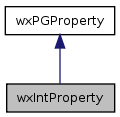Basic property with integer value. Seamlessly supports 64-bit integer (wxLongLong) on overflow. More...
#include <props.h>

Public Member Functions | |
| virtual wxValidator * | DoGetValidator () const |
| virtual bool | IntToValue (wxVariant &variant, int number, int argFlags=0) const |
| virtual bool | ValidateValue (wxVariant &value, wxPGValidationInfo &validationInfo) const |
| wxIntProperty (const wxString &label, const wxString &name, const wxLongLong &value) | |
| wxIntProperty (const wxString &label=wxPG_LABEL, const wxString &name=wxPG_LABEL, long value=0) | |
| virtual | ~wxIntProperty () |
Static Public Member Functions | |
| static bool | DoValidation (const wxPGProperty *property, wxLongLong_t &value, wxPGValidationInfo *pValidationInfo, int mode=wxPG_PROPERTY_VALIDATION_ERROR_MESSAGE) |
| static wxValidator * | GetClassValidator () |
Basic property with integer value. Seamlessly supports 64-bit integer (wxLongLong) on overflow.
Example how to use seamless 64-bit integer support
Getting value:
wxLongLong_t value = pg->GetPropertyValueAsLongLong();
or
wxLongLong_t value;
wxVariant variant = property->GetValue();
if ( variant.GetType() == wxT("wxLongLong") )
value = wxLongLongFromVariant(variant);
else
value = variant.GetLong();
Setting value:
pg->SetPropertyValue(longLongVal);
or
property->SetValue(WXVARIANT(longLongVal));
Supported special attributes:
Definition at line 403 of file props.h.
| wxIntProperty::wxIntProperty | ( | const wxString & | label = wxPG_LABEL, |
|
| const wxString & | name = wxPG_LABEL, |
|||
| long | value = 0 | |||
| ) |
| virtual wxIntProperty::~wxIntProperty | ( | ) | [virtual] |
| wxIntProperty::wxIntProperty | ( | const wxString & | label, | |
| const wxString & | name, | |||
| const wxLongLong & | value | |||
| ) |
| virtual wxValidator* wxIntProperty::DoGetValidator | ( | ) | const [virtual] |
Returns pointer to the wxValidator that should be used with the editor of this property (NULL for no validator). Setting validator explicitly via SetPropertyValidator will override this.
In most situations, code like this should work well (macros are used to maintain one actual validator instance, so on the second call the function exits within the first macro):
wxValidator* wxMyPropertyClass::DoGetValidator () const { WX_PG_DOGETVALIDATOR_ENTRY() wxMyValidator* validator = new wxMyValidator(...); ... prepare validator... WX_PG_DOGETVALIDATOR_EXIT(validator) }
Reimplemented from wxPGProperty.
| static bool wxIntProperty::DoValidation | ( | const wxPGProperty * | property, | |
| wxLongLong_t & | value, | |||
| wxPGValidationInfo * | pValidationInfo, | |||
| int | mode = wxPG_PROPERTY_VALIDATION_ERROR_MESSAGE | |||
| ) | [static] |
Validation helper.
| static wxValidator* wxIntProperty::GetClassValidator | ( | ) | [static] |
| virtual bool wxIntProperty::IntToValue | ( | wxVariant & | value, | |
| int | number, | |||
| int | argFlags = 0 | |||
| ) | const [virtual] |
Converts 'number' (including choice selection) into proper value 'variant'. Returns true if new (different than m_value) value could be interpreted from the integer.
| argFlags | If wxPG_FULL_VALUE is set, returns complete, storable value instead of displayable |
Reimplemented from wxPGProperty.
| virtual bool wxIntProperty::ValidateValue | ( | wxVariant & | value, | |
| wxPGValidationInfo & | validationInfo | |||
| ) | const [virtual] |
Implement this function in derived class to check the value. Return true if it is ok. Returning false prevents property change events from occurring.
Reimplemented from wxPGProperty.